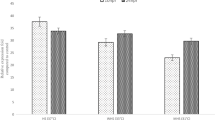Abstract
DNA strand damage, using the single-cell gel electrophoresis (comet) method, was determined in different-stage embryos of grass shrimp (Palaemonetes pugio) collected from surface waters of a local estuary near Savannah, Georgia, USA. Late-stage embryos collected from the estuarine river at midday in the summer or placed in a solar simulator showed extensive DNA strand damage. The solar simulator, which produced the total irradiance found at midday in the summer at 34°N caused DNA strand damage in embryos similar to that found in sunlight-exposed embryos. A large increase in cyclobutane pyrimidine dimers (18 cyclobutane pyrimidine dimers per 1000 kilobases) were detected in DNA from the late-stage embryos exposed to the solar simulator for 1 h (solar irradiance of 126 μW cm−2). DNA repair took place within a few hours when late-stage embryos collected at midday from the river were transferred to the dark. Early grass-shrimp embryo stages showed no DNA strand damage either after placement in the solar simulator or when collected at midday in the summer. This lack of solar-damaged DNA in early-stage embryos was probably due to the presence of high concentrations of carotenoids, which can act as anti-oxidants to prevent damage from activated oxygen species produced by cells exposed to ultraviolet light. These carotenoids are utilized by the developing embryos, and only low concentrations of carotenoids were present in late embryo stages.
Similar content being viewed by others
Author information
Authors and Affiliations
Additional information
Received: 24 May 1999 / Accepted: 11 May 2000
Rights and permissions
About this article
Cite this article
Kim, G., Lee, R. & Mitchell, D. Damage to grass shrimp (Palaemonetes pugio) embryo DNA by summer sunlight followed by DNA repair in the dark. Marine Biology 137, 675–682 (2000). https://doi.org/10.1007/s002270000371
Issue Date:
DOI: https://doi.org/10.1007/s002270000371



